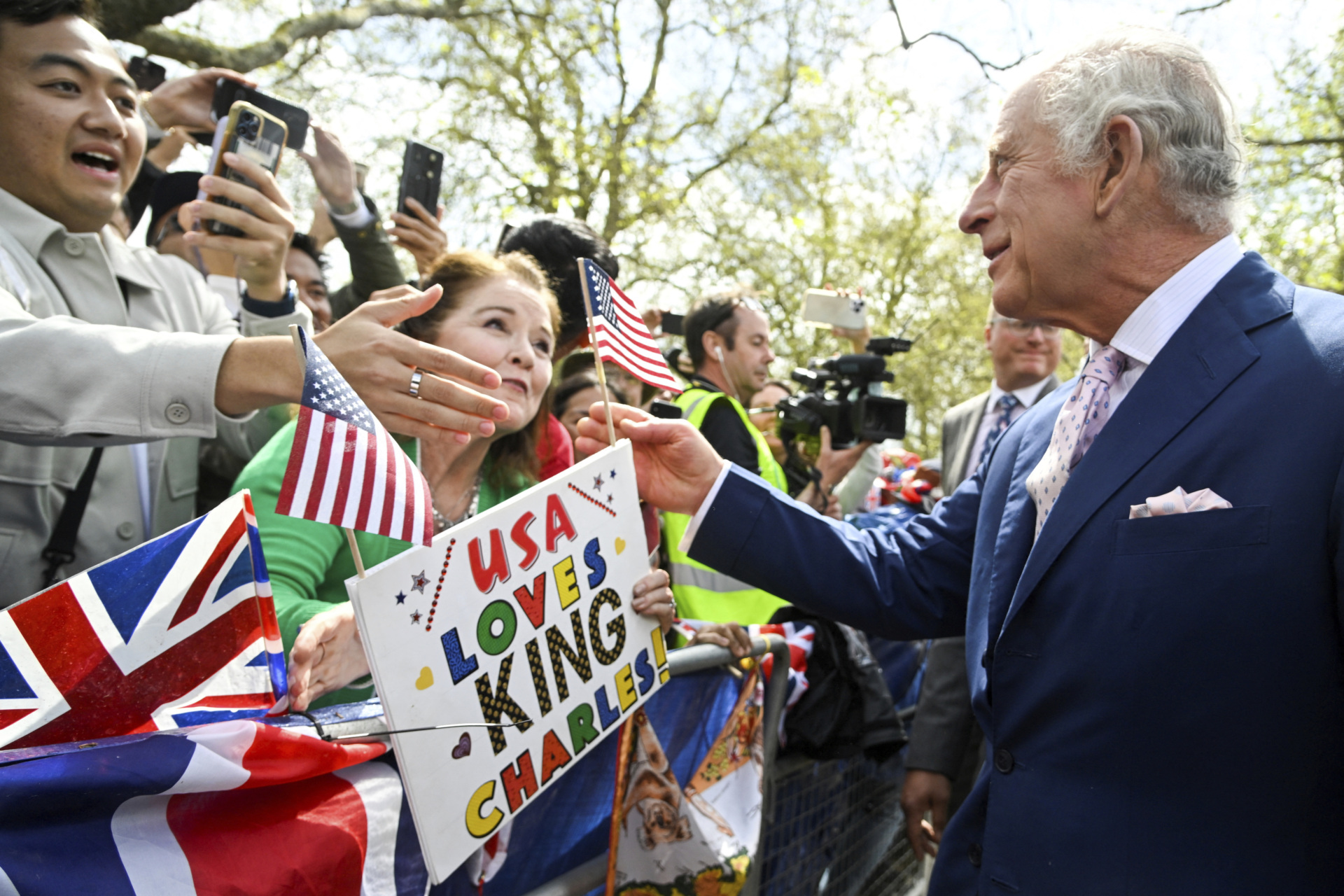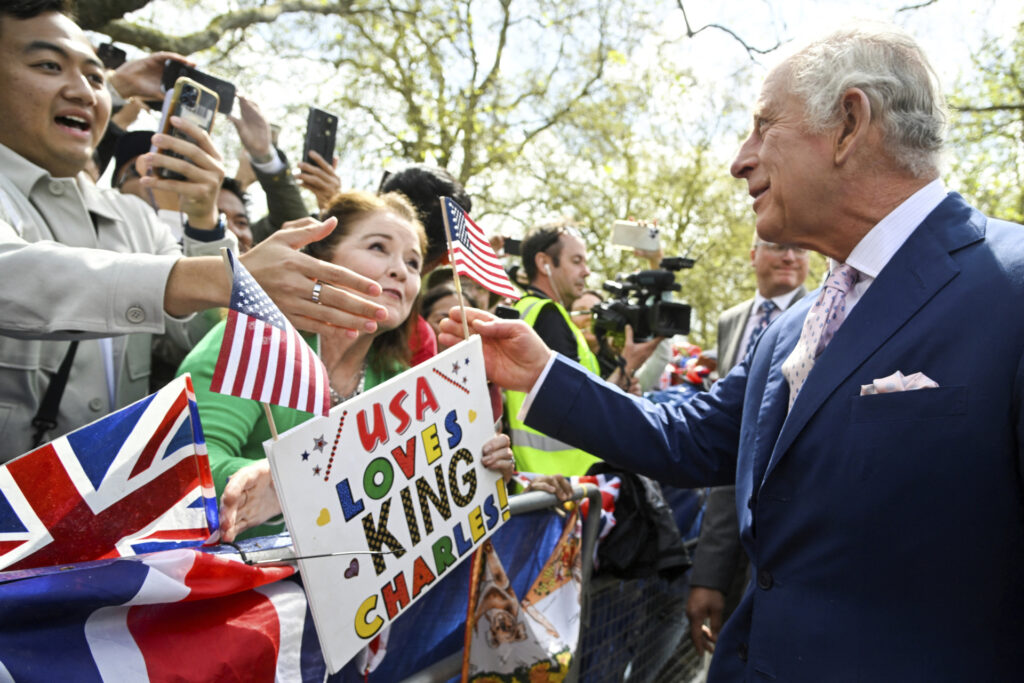It’s perfectly possible to admire the pageantry and be fascinated by the millennia of history on show this weekend without any resorting to mental gymnastics. Here’s what to watch out for.
With the crowning of King Charles III this weekend, the British — and, very likely, many millions if not billions around the globe — will watch in real-time an act of living tradition and faith stretching back into the earliest reaches of human history. This is a spectacle beyond belief, the accretion of a millennium of custom, a deeply religious ceremony featuring buildings and even uniforms older than the United States itself.
Great. But your better self won’t let you forget: America fought a war against these assholes and won. Even if you pay way more tax to Washington now than you did the crown then, it doesn’t matter, there is a principle at stake here.

Britain’s King Charles III greets well-wishers outside Buckingham Palace, in London, Friday, May 5, 2023 a day before his coronation takes place at Westminster Abbey. (Toby Melville, Pool via AP)
Yet the fact remains there’s a difference here between being a royalist for the day and a monarchist for life. Put it this way: a royalist is someone interested in the Royal family. This is incredibly common worldwide, Queen Elizabeth II, who died last year, was said to be the most-known woman on Earth.
A monarchist, on the other hand, is someone who believes monarchy — having a king — is the best system of government. People fight and die for this sort of stuff.
In the United Kingdom, it’s normal to be both: you would both have deeply mourned the death of the Queen and believe having a constitutional monarchy is the best deal for Britain. If it saves us from having our own Emmanuel Macron or Joe Biden, that’s not bad going.
It’s possible to be a monarchist but not a royalist, even in a country that has a monarchy already: in other words you think there should be a king but the wrong person is in the chair at the moment. The Jacobites in Britain are a good example of that.
And monarchists — even low-key ones — turn up in the strangest places sometimes. As reported last year, the death of Queen Elizabeth II prompted an outpouring of grief in France, of all places! Never mind a war of independence, they killed their king in 1793. As was reported in 2022 on the “hidden French royalist streak”:
“She represented a form of stability, a unifying figure,” said Veronique, a 63-year-old retired legal worker, after laying flowers. “We maybe miss having this point of stability.”
Philippe Marliere, a French political scientist at University College London, suggested that many French people had a royalist streak and a form of nostalgia for their blue-blooded forebears.
While monarchists do exist in America, they’re a fleeting minority and that probably isn’t you. You enjoy watching the pomp and pageantry, thought it was amazing how the old Queen gave her whole life in service to a country with barely a foot put wrong in 70 years, and feel Prince Harry is badly betraying his father and brother with all this woke mucking about.
So enjoy, royalist. Guilt-free! Today history is both honoured and made.
What to watch out for
Anointed by God
Despite the highly publicised — and probably counter-productive, time will tell on that one — attempts to tone down the coronation, it remains at its heart a deeply Christian religious ceremony. The King will wear a golden crown adorned by a cross surmounting a globe: an unmistakable symbol of a Christian world.
During the service, the King will be anointed with holy oils from Jerusalem. The only part of the service that will not be televised — although it is not clear why, given there is presumably no serious objection to a male chest being bared, as there may have been with the old Queen’s televised coronation in 1953 — will have the head, breast, and hands crossed with the blessed oil.
The final part of this Christian service is the King and Queen taking holy communion, that most fundamental act. Citing Christian author Ian Bradley, Christianity Today notes of the coronation: “At their coronations kings and queens are not simply crowned and enthroned but consecrated, set apart and anointed, dedicated to God and invested with sacerdotal garb and symbolic regalia. Here, if anywhere, we find the divinity which hedges the throne.”
I’m honoured and grateful that the Chrism oil that will be used to anoint His Majesty The King was consecrated in Jerusalem today by
His Beatitude Patriarch Theophilos III and the Anglican Archbishop in Jerusalem. pic.twitter.com/ZDQ3yFDgC0— Archbishop of Canterbury (@JustinWelby) March 3, 2023
Deep history
England was already a fairly ancient place when the 11th-century Norman invasion established some new ways of doing things. A lot of the key players in Saturday’s ceremonies, incredibly enough, date nearly as far back as that. Westminster Abbey itself just about predates the first Edward and has hosted every coronation since 1066, one of a handful of exceptionally storied and historic buildings that feature in British constitutional life.
The equally well-known Royal residence Buckingham Palace, for instance — from and to which King Charles travels for the coronation — is at most a sprightly 300 years old, and the public-facing facade with its famous balcony is barely 100 years old, covering up an earlier style of palace courtyard.
For the ceremony, the King will sit on Kind Edward’s Chair, also known as the Coronation Chair, upon which a remarkable 26 monarchs have been crowned. Made in 1300, the oak chair is the oldest still-in-use piece of furniture in the United Kingdom and shows its ages in several ways. While parts have been replaced, it still demonstrates historic bomb damage and even a great deal of graffiti scrawled into it with pocked-knives by 18th-century naughty schoolboys.
Even the spoon used to anoint the king with holy oil is believed to be around 900 years old.
The Coronation Chair, made at the start of the 14th century, is a focal point of the Coronation service.
Also known as St Edward’s Chair, King Charles III will be the 27th monarch to be anointed and crowned on it.
[📸: @wabbey ]#Coronation pic.twitter.com/9jxMIbCwPF
— The Church of England (@churchofengland) May 2, 2023


